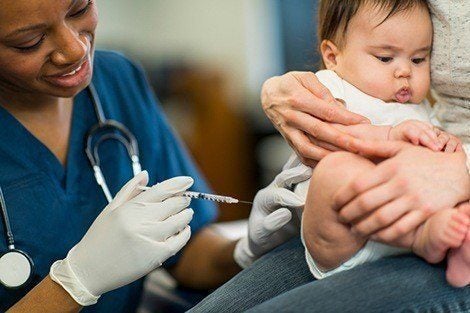July 11, 2017 – A significant jump in the number of pertussis cases in the U.S. may be due to increasing numbers of nonmedical vaccine exemptions as well as waning immunity among those who have been vaccinated, according to a new study from Harvard researchers.
The incidence of pertussis, or whooping cough—a highly contagious respiratory illness that sends people into coughing fits and which can be deadly, particularly in babies—declined significantly over the course of four decades after a vaccine was introduced in the late 1940s. But the number of cases started creeping back up in the 1980s and 1990s, then increased dramatically in the mid-2000s. In 2012, there were 48,000 reported cases of pertussis in the U.S.—the highest number since 1955.
For the new study, the researchers—Carlin Aloe, Martin Kulldorff, and Barry Bloom—looked at five states that had pertussis rates in 2012 that were above the national average and for which there was detailed county-level data. For each county, researchers compared the incidence of pertussis with the number of nonmedical vaccine exemptions. They also looked at pertussis clusters among two different age groups—5 years and younger and 10-14 years.
“There were likely multiple reasons for these outbreaks,” said Bloom, Joan L. and Julius H. Jacobson Research Professor of Public Health at Harvard Chan School and senior author of the study, which was published online June 20, 2017 in PNAS (Proceedings of the National Academy of Sciences). “Our paper shows two things. One is that when you look at counties that have a lot of pertussis cases, they are the same counties that also have a high level of vaccine exemptions, which suggests an association between the two. Our other finding is that 10- to 14-year-olds who had been vaccinated were as susceptible to pertussis as kids who had never been vaccinated—suggesting that the vaccine’s effectiveness was not long lasting.”
Non-medical vaccine exemptions have been on the rise over the past two decades, with many parents declining vaccines for their children because they believe that vaccines aren’t safe—although substantial evidence points to the contrary, Bloom said.
In addition, a growing body of research suggests that some vaccines, previously thought to confer long-term protection against diseases such as pertussis, measles, and mumps, actually lose effectiveness over time.
Given the study’s findings, officials in states with high pertussis rates may want to rethink their policies on nonmedical vaccine exemptions, said Bloom. While not all of the counties with high rates of vaccine exemptions experienced pertussis outbreaks, they are clearly at risk for outbreaks in the future, he said.
Lead author Carlin Aloe, who received the 2016 Dean’s Prize for the outstanding thesis in biology at Harvard University Extension School, noted that only two states in the U.S., Mississippi and West Virginia, don’t allow nonmedical vaccine exemptions—and pertussis rates in those states are much lower than the states studied in the paper.
Federal officials may also want to consider revising recommendations for pediatricians on when and how often to give pertussis vaccines, said the researchers. “Our work suggests that maybe we should revaccinate teens to boost their immunity,” Bloom said.
